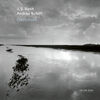Donizetti : Lucia di Lammermoor (Remastered)
Georges Prêtre
Classical - Released January 1, 1966 | RCA Red Seal
Consolations
Saskia Giorgini
Solo Piano - Released June 9, 2023 | PentaTone
Elisabeth Jacquet de la Guerre: Céphale et Procris
Reinoud Van Mechelen
Classical - Released February 9, 2024 | Château de Versailles Spectacles
Psyché
Christophe Rousset
Classical - Released January 13, 2023 | Château de Versailles Spectacles
Mendelssohn: Symphonies Nos 1-5, Overtures, A Midsummer Night's Dream
John Eliot Gardiner
Symphonies - Released September 21, 2018 | LSO Live
Beethoven: Piano Concertos 0-5
Mari Kodama
Classical - Released October 11, 2019 | Berlin Classics
Domenico Scarlatti: Stabat Mater & Other Works
Le Caravansérail
Classical - Released April 8, 2022 | harmonia mundi
Meyerbeer: Robert le Diable
Orchestre National Bordeaux Aquitaine
Classical - Released September 23, 2022 | Bru Zane
Handel: Rodelinda
The English Concert
Classical - Released May 14, 2021 | Linn Records
Le cinquième élément
Eric Serra
Film Soundtracks - Released May 5, 1997 | Universal Music Division MCA
Rachmaninoff: The Piano Concertos & Paganini Rhapsody
Yuja Wang
Classical - Released September 1, 2023 | Deutsche Grammophon (DG)
Ravel: L'Heure espagnole - Bolero
François-Xavier Roth
Opera - Released June 16, 2023 | harmonia mundi
Hamelin: New Piano Works
Marc-André Hamelin
Classical - Released February 2, 2024 | Hyperion
Atys
Christophe Rousset
Opera - Released January 5, 2024 | Château de Versailles Spectacles
Rossini: Il barbiere di Siviglia
Teresa Berganza
Opera - Released January 1, 1972 | Deutsche Grammophon (DG)
David & Jonathas
Gaétan Jarry
Classical - Released June 9, 2023 | Château de Versailles Spectacles
Lully : Alceste
Christophe Rousset
Full Operas - Released December 1, 2017 | Aparté
Saint-Saëns: Symphony No. 3 in C Minor "Organ Symphony", Introduction et rondo capriccioso in A Minor & La muse et le poète
Noah Geller
Classical - Released June 9, 2015 | Reference Recordings
Father and Son
Einav Yarden
Classical - Released May 12, 2023 | Challenge Classics
J.S. Bach: Clavichord
András Schiff
Solo Piano - Released January 27, 2023 | ECM New Series






















 Suppose you have a more precise idea of what you want. If you are searching for the album "Bad" by Michael Jackson, type michael jackson bad. The album in question will be displayed at the top, as it is the most relevant.
Suppose you have a more precise idea of what you want. If you are searching for the album "Bad" by Michael Jackson, type michael jackson bad. The album in question will be displayed at the top, as it is the most relevant.
 By default, search results are sorted in order of relevance. The drop-down menu to the right of "Sort by" allows you to display the results in the desired order.
By default, search results are sorted in order of relevance. The drop-down menu to the right of "Sort by" allows you to display the results in the desired order.